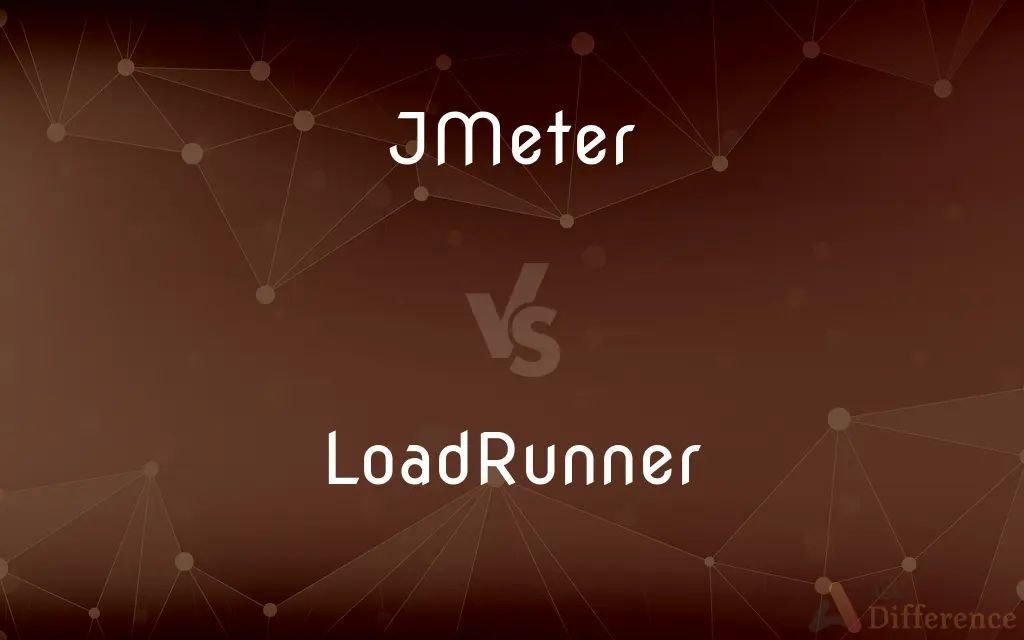JMeter vs. LoadRunner — What's the Difference?
By Tayyaba Rehman — Published on January 1, 2024
JMeter is an open-source load testing tool; LoadRunner is a commercial load testing platform with extensive features.

Difference Between JMeter and LoadRunner
Table of Contents
ADVERTISEMENT
Key Differences
JMeter, an Apache project, is open-source software used for performance and load testing, which can simulate multiple users with concurrent threads. LoadRunner, by Micro Focus, is a commercial performance testing tool that simulates thousands of users to apply load on applications.
JMeter is widely used for its ability to perform load and stress testing on a variety of applications. LoadRunner offers more advanced scenario creation and monitoring features, providing in-depth analysis of application performance under load.
Designed for ease of use, JMeter's user interface allows testers to quickly create test plans. LoadRunner has a more complex interface with detailed scripting and scenario options, catering to experienced users.
JMeter supports multiple protocols primarily related to web applications, and its functionality can be extended with plugins. LoadRunner supports a wider range of protocols and technologies out of the box and provides extensive analysis and reporting features.
As an open-source tool, JMeter is free and has a large community for support. LoadRunner is a paid tool, offering professional support and additional testing capabilities such as network and end-to-end system performance analysis.
ADVERTISEMENT
Comparison Chart
Licensing
Open-source, free to use.
Commercial, with licensing fees.
User Interface
User-friendly interface.
More complex, designed for experienced users.
Protocol Support
Supports web-related protocols.
Supports a wide range of protocols.
Extensibility
Extensible via plugins.
Extensive built-in features.
Community Support
Large open-source community.
Professional support from Micro Focus.
Compare with Definitions
JMeter
Supports various protocols, including HTTP, JDBC, and SOAP.
JMeter was configured to test our web service’s SOAP interface.
LoadRunner
Offers in-depth performance analytics and reporting.
LoadRunner’s reports helped us optimize our application’s performance.
JMeter
Capable of measuring performance of both static and dynamic resources.
JMeter measured the response time of dynamic web pages.
LoadRunner
LoadRunner uses virtual users (Vusers) to simulate load.
We created thousands of Vusers in LoadRunner for our load test.
JMeter
Provides a GUI for test plan building and execution.
The team appreciated JMeter’s GUI for setting up the test scenarios.
LoadRunner
Suitable for enterprise-level performance testing.
The corporation chose LoadRunner for its enterprise application testing needs.
JMeter
JMeter can perform load tests on various server types.
JMeter tested the load capacity of our FTP server.
LoadRunner
A performance testing tool by Micro Focus.
LoadRunner identified the bottlenecks in our software under heavy load.
JMeter
A Java-based open-source load testing tool.
We used JMeter to simulate high traffic on our website.
LoadRunner
Supports advanced scripting for complex scenarios.
Our developers wrote custom scripts in LoadRunner for a realistic load test.
Common Curiosities
Can LoadRunner simulate more protocols than JMeter?
Yes, LoadRunner supports a broader range of protocols than JMeter.
Does JMeter require a license?
No, JMeter is open-source and free to use.
Can LoadRunner provide detailed performance insights?
Yes, LoadRunner offers extensive performance analytics and reporting.
Is JMeter easy to learn for beginners?
JMeter has a user-friendly interface which makes it easier for beginners.
Is JMeter suitable for web application testing?
Yes, JMeter is commonly used for testing web applications.
What are virtual users in LoadRunner?
Virtual users (Vusers) simulate real users in a LoadRunner test.
Are there any costs associated with LoadRunner?
Yes, LoadRunner is a commercial tool and requires purchasing a license.
Does JMeter support distributed testing?
Yes, JMeter supports distributed testing to simulate a large number of users.
Can JMeter be integrated with other tools?
Yes, JMeter can be integrated with various CI/CD and monitoring tools.
Can JMeter handle complex testing scenarios?
JMeter can handle complex scenarios, especially when extended with plugins.
Is community support available for JMeter?
Yes, JMeter has a large and active community for support.
Can LoadRunner be used for stress testing?
Yes, LoadRunner is well-suited for stress testing.
Does LoadRunner have a steep learning curve?
Yes, LoadRunner can be complex and may require more time to learn.
Is LoadRunner better than JMeter for enterprise testing?
LoadRunner is often preferred for enterprise testing due to its advanced features.
Does LoadRunner offer any cloud-based testing options?
Yes, LoadRunner provides cloud-based testing solutions.
Share Your Discovery

Previous Comparison
Carbohydrates vs. Protein
Next Comparison
SPSS vs. ExcelAuthor Spotlight
Written by
Tayyaba RehmanTayyaba Rehman is a distinguished writer, currently serving as a primary contributor to askdifference.com. As a researcher in semantics and etymology, Tayyaba's passion for the complexity of languages and their distinctions has found a perfect home on the platform. Tayyaba delves into the intricacies of language, distinguishing between commonly confused words and phrases, thereby providing clarity for readers worldwide.
















































